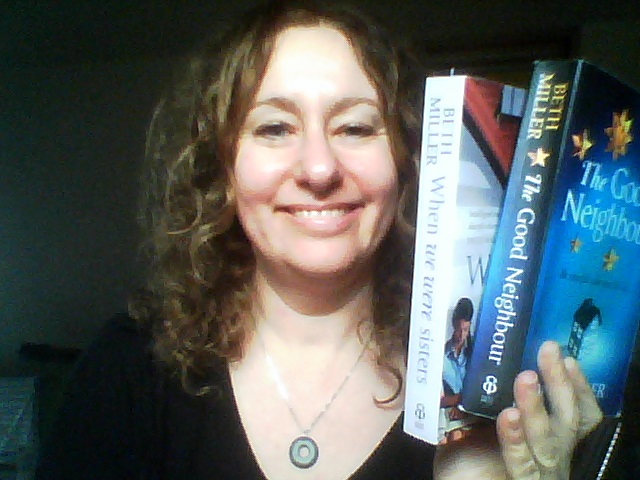Interview with author Beth Miller
We talk to fiction author Beth Miller, whose novels When We Were Sisters and The Good Neighbour weave laugh-out-loud humour into serious themes of dysfunctional families and mental illness

Your bio mentions your love of The Archers and tea, and previous jobs as a sex educator and alcohol counsellor and ‘inept audio-typist’ as well as having a PhD in psychology. You obviously have a good sense of humour! Does this help when writing about serious topics, as both your books do? And do you find it easy to weave humour into your writing?
Well, that’s interesting, because although I think my first novel, When We Were Sisters, is quite funny, I rather seemed to lose my sense of humour when writing The Good Neighbour. Generally I prefer to read writing that is funny, and I do think it helps to leaven difficult or heavy topics. The novel I’m currently writing will be funny, I hope. I do mention tea in both my existing novels, and the new one actually has someone putting on the kettle in chapter one. Tea is a big part of my life! As for The Archers, I have just published an ‘unofficial guide’ to the programme, so I do currently know a lot of useless facts about that.
Without giving away too much of the plot of your latest book, The Good Neighbour, mental illness plays a big part. What inspired you when creating the character of Cath? Did you draw on your knowledge of psychology?
Cath’s personality was inspired by something I learned about while studying psychology. It was an area of mental health that always fascinated me *she said cryptically, trying not to give spoilers*. But until I wrote the book, I never had to think about why someone would act that way. It was good for me to try and get inside Cath’s head; to try and work out the reasons for her unusual behaviour. In the end, I did have some empathy for her.

Both of your novels deal with a range of subjects, but family is at the heart of both (dysfunctional families, adolescence, clash of cultures, adultery). Was this a conscious starting point for both stories; the crisis point in a family that creates tension and a good story?
I don’t think it was conscious, but I am really interested in families, and the way that different members of the family see things in such contrasting ways. Even at a big happy event like a wedding, no two memories of the day will be exactly the same. So with something difficult and drawn-out, like a marriage breakdown or something, it’s no wonder everyone has clashing perspectives and recollections, no wonder there is so much conflict. I do like a nice conflict. *Rolls up sleeves*
In both books, you tell the story from the point of view of different characters. Why did you choose this style of storytelling? Do you find it easy to create and sustain different voices?
In fact, I find it difficult to write in just one voice! When We Were Sisters actually had four different narrators originally, but I was correctly encouraged/forced to cut that down to two. The Good Neighbour has three narrators. It’s because of what I said earlier – it allows me to explore the differing perspectives people hold about the same event. I like that there is not really a ‘correct’ version of events, and I like being able to show how each person has arrived at the version they have. There’s no objective reality, I suppose; all we have are the stories we tell about ourselves.
How did you get your first book published? What kept you going and kept your belief in yourself that you could do it? Did being a member of The Prime Writers (a writing group of authors aged 40+) provide a lot of support and contacts?
I think the only thing that kept me going was the fact that I had already put so much time and effort into writing the book! To give it up would mean that was all thrown into the mud. From the moment I wrote the words ‘Chapter 1’ to the moment I got published was 12 years. I’m so relieved I kept going, now, of course. I could have given up at almost any point in those 12 years. I reckon that persevering is a writer’s secret weapon. I often didn’t have belief in myself, I’m afraid. But two things really helped: firstly, being a member of a writing group who gave me the support and encouragement to believe that it was worth going on with. And secondly, getting an agent, because that meant that someone in the industry believed my book was good enough to be published. So that’s how I got published. I got an agent, and she found a publisher. That makes it sound rather more straightforward than it was. Of course, how I got an agent is another story. The Prime Writers are a brilliant support group, but they are for published writers, so I didn’t become a member until after my first book came out.
What are you working on at the moment?
I’m writing my third novel, which is about a woman who leads a double life. It’s a bit unformed as yet, though I have quite a lot of it in my head. If only I could just think it, and the words appear on the page. I am bravely trying to write it from the point of view of just one narrator. We’ll see how that goes…
When We Were Sisters (Ebury Press, £7.99), The Good Neighbour (Ebury Press, £7.99) and For The Love of The Archers (Summersdale, £9.99) are out now.
For more about Beth, visit www.bethmiller.co.uk
Photograph: iStock








